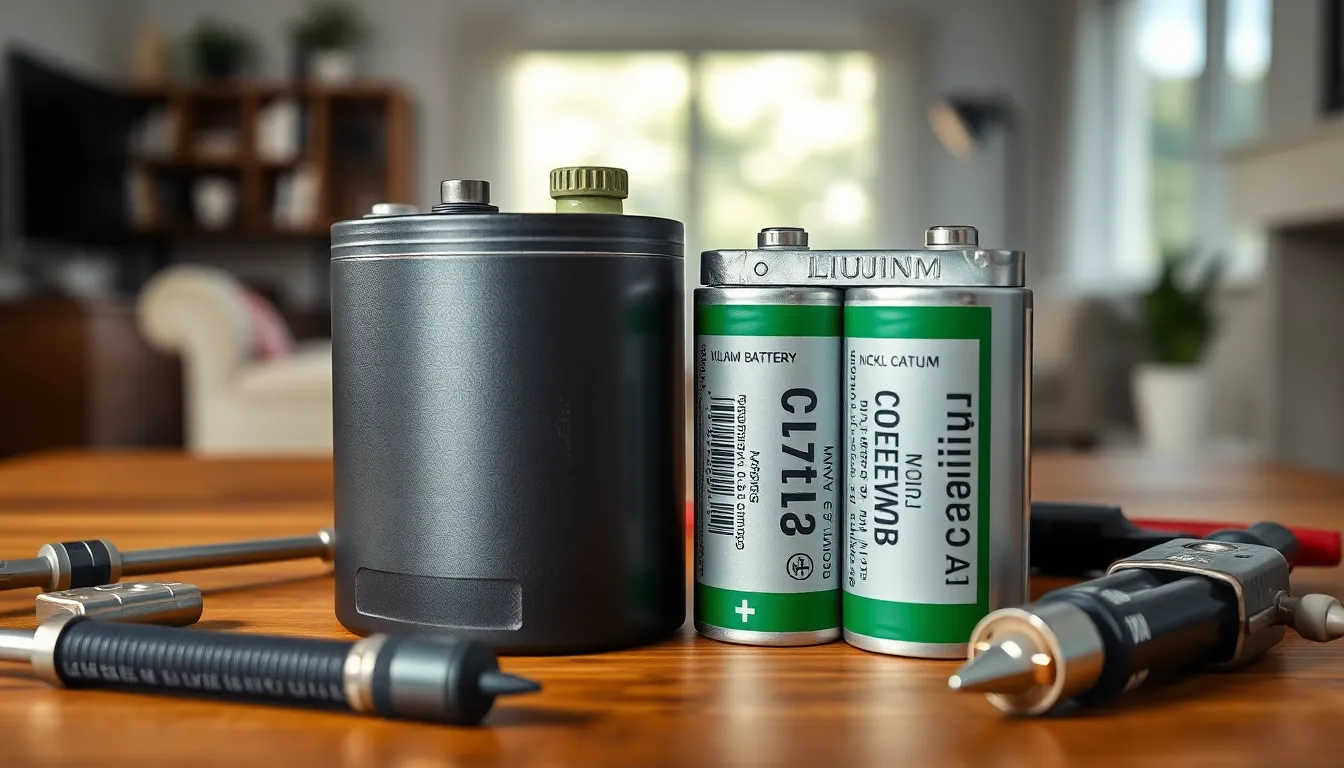Table of Contents
ToggleIn a world where home security is more crucial than ever, the unsung hero often goes unnoticed: the home alarm system battery. Imagine your trusty alarm system, ready to spring into action at a moment’s notice, only to be thwarted by a battery that’s as dead as last week’s leftovers. It’s not just a power source; it’s the lifeblood of your home’s defense against intruders.
Overview Of Home Alarm System Battery
Home alarm systems depend on reliable batteries for uninterrupted protection. These batteries provide power during outages, ensuring that alarm systems function as intended. Various types of batteries are used in these systems, including alkaline, lithium-ion, and sealed lead-acid varieties. Each battery type has unique performance characteristics and lifespans, making careful selection essential for optimal functionality.
Lithium-ion batteries tend to offer longer lifespans compared to alkaline batteries. Maintaining these batteries requires regular checks to ensure they remain charged and effective. Rechargeable options are also available, providing cost-saving benefits over time as they can be used repeatedly.
Battery life for home alarm systems typically ranges from two to five years. Factors like usage, environmental conditions, and specific system requirements influence battery longevity. As a result, regular monitoring is critical. Alarm systems often incorporate indicators that signal low battery levels, prompting timely replacement.
Understanding battery replacement procedures can enhance system reliability. Most systems come with user manuals that detail how to replace batteries safely and efficiently. Following these guidelines ensures that systems maintain peak performance without compromising security.
Overall, it’s crucial to prioritize battery health within home alarm systems. Investing in high-quality batteries and conducting regular maintenance checks can significantly enhance home security. Proper battery management secures an alarm system’s ability to protect against threats effectively.
Types Of Home Alarm System Batteries

Home alarm systems utilize various battery types to maintain functionality and security. Each battery type has unique benefits and considerations.
Lithium Ion Batteries
Lithium-ion batteries are prevalent in modern alarm systems due to their efficiency and longevity. Users can expect these batteries to last anywhere from three to five years, depending on usage. Known for a compact design, they occupy less space in installations. Regular recharging is essential to maximize their lifespan. Many homeowners appreciate the lightweight nature, allowing for easy installation and replacement. Environmental factors also affect battery performance, with high temperatures causing degradation. Maintenance becomes vital to ensure reliability and optimal function.
Nickel Cadmium Batteries
Nickel cadmium batteries (NiCd) are another option commonly found in home alarm systems. These batteries typically have shorter lifespans, averaging two to three years. One advantage includes their ability to perform well in various temperatures. However, they may require more frequent charging than lithium-ion batteries. Some users find the cost-effectiveness appealing, especially for budget-conscious installations. Often, they can be charged and discharged numerous times without significant loss of capacity. Regular inspection and proper disposal are important, ensuring both efficacy and environmental responsibility.
Factors To Consider When Choosing A Battery
Selecting the right battery for a home alarm system involves evaluating various factors. Compatibility stands out as a critical consideration.
Compatibility
Compatibility with the alarm system determines whether a battery can provide reliable power. Checking the manufacturer’s specifications ensures proper fit and performance. Using a battery incompatible with the system can lead to malfunctions or failures. Each home alarm system often has unique power requirements. Thus, understanding these requirements is essential for seamless operation. Replacing batteries with the same brand or model typically guarantees safety and efficiency.
Battery Life
Battery life significantly impacts the performance of the alarm system. Lithium-ion batteries typically last three to five years, making them a preferred option for longevity. Nickel cadmium batteries offer shorter lifespans of two to three years but excel in various temperature ranges. Regular monitoring of battery age and health helps maintain security effectiveness. Ensuring timely replacements minimizes the risk of unexpected failures. Seeking high-quality batteries contributes to optimal system reliability and peace of mind.
Installing And Maintaining Your Home Alarm System Battery
Proper installation and maintenance ensure the battery of a home alarm system functions efficiently, providing consistent security.
Installation Tips
Choose the correct battery type based on the alarm system’s specifications. Use a compatible lithium-ion or nickel cadmium option for optimal performance. Position the battery in a clean, dry location to avoid damage. Ensure that connections are secure to prevent interruptions in power. Test the system after installation to confirm it operates correctly and monitors status indicators for alerts.
Maintenance Practices
Regularly check the battery levels, aiming to perform this task monthly. Keep an eye out for any corrosion or physical damage. Replace batteries as their lifespans approach, generally between two to five years based on type. Maintain a log of replacement dates to keep track of intervals. Follow local guidelines for disposal to encourage environmental responsibility while ensuring system reliability.
Signs Your Home Alarm System Battery Needs Replacement
An alarming sign of a failing battery is the frequent chirping or beeping of the alarm system. Such sounds usually indicate a low battery warning, suggesting immediate attention is necessary. Another indicator involves the alarm system displaying a low battery message on its control panel, often seen during routine checks.
Diminished battery life shows declining performance, affecting the overall functionality of the home alarm system. Homeowners might notice that the system malfunctions or fails to activate during tests, further underscoring the urgency for battery replacement.
Visual signs can also signal a battery issue. For instance, swollen or leaking batteries indicate potential hazards. Such conditions can compromise safety and damage the alarm system itself.
Regular monitoring offers additional clues. If the battery lasts less than its expected lifespan—generally three to five years for lithium-ion—replacement may be necessary sooner than anticipated. Monthly checks contribute to system reliability, ensuring timely interventions when observing any unusual behavior.
Inconsistent power during critical moments, like alarms not triggering, raises concerns. Such scenarios can jeopardize home security, highlighting the need for immediate replacement. Lastly, paying attention to age can offer context; most batteries eventually lose capacity, warranting replacement to maintain safety standards.
Evaluating these signs ensures the alarm system operates optimally, providing peace of mind and enhancing home safety. Prioritizing battery health directly influences the effectiveness of the overall security setup.
A reliable home alarm system battery is essential for maintaining effective security. Regular monitoring and timely replacements ensure that the system functions optimally when needed most. Choosing the right battery type and adhering to proper installation and maintenance practices can significantly enhance safety and peace of mind.
Staying attentive to signs of battery wear can prevent unexpected failures. By prioritizing battery health and following disposal guidelines, homeowners can contribute to both their security and environmental responsibility. Investing in quality batteries is a small yet impactful step toward a safer home.





